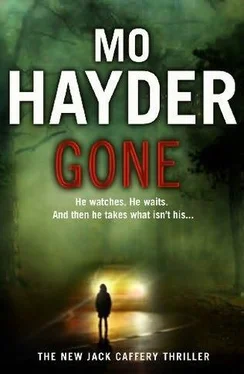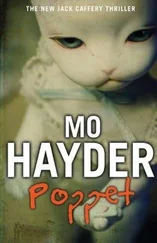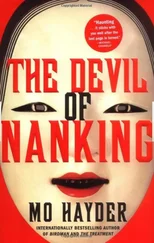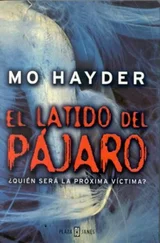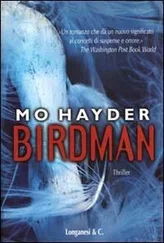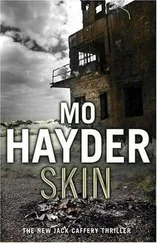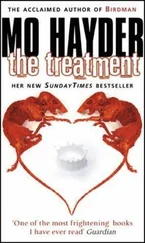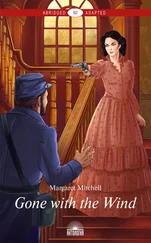‘Mr Caffery?’
He looked up, his thoughts broken.
Jonathan was watching him. ‘I said – what do you think he’s done to my daughter?’
He shook his head slowly. ‘Shall we do what we came to do?’
‘I’d hoped that wasn’t what you thought.’
‘I didn’t say I thought anything.’
‘No. But you do. Don’t worry. I won’t ask again.’ Jonathan tried a brave smile and failed. He shuffled away from the window to the centre of the room.
They stood for a few minutes, side by side, neither speaking. Caffery tried to let his mind empty. He let the sounds and smells and colours come into his head. He waited for things to do something – to send a message like a banner shooting into his consciousness. Nothing happened. ‘Well?’ he said eventually. ‘Has he changed anything?’
‘I don’t think so.’
‘Where do you think the camera was when he took that photo?’ Caffery pulled out Rose’s mobile, looked at Moon lying on the bed and turned it at arm’s length until he got the right angle. ‘He must have had it on a tripod: it’s taken from high up.’
‘Maybe he put it above the door. Rested it on the frame?’
Caffery took a step nearer the door. ‘What are those in the wall? Screws?’
‘I think there was a clock up there years ago. I can’t remember, to be honest.’
‘Maybe he put a bracket in the wall.’ Caffery got a chair from under Martha’s desk, pushed it against the door and stood on it. ‘To hold the camera.’ He put on his glasses and peered closely at the screws. One was silver, poking out about half a centimetre, but the second wasn’t a screw: it was a hole. He dug his finger into it and something inside moved. Swearing under his breath, he fished in his pocket for his penknife, pinched out the tweezer tool with his nails and, very carefully, pulled out the object.
He got off the chair, and came to Jonathan with his index finger held up. On top of it rested a tiny black disc, the size of a penny, faint shapes of electrical circuitry embedded in it. On one side was the silvery slip of a lens. It probably weighed less than twenty grams.
‘What’s that ?’
Caffery shook his head. Still computing. And then, in a second, it came to him. ‘Fuck.’ He got up on the chair and shoved the thing back into the hole. He got down and led Jonathan out of the room.
‘What?’ Jonathan was staring at him, bewildered.
Caffery put a finger to his lips. He was scrolling through numbers in his phone. The hairs were standing up on the back of his neck.
‘What is it?’
‘Ssh!’ He dialled the number, held it to his ear, listened to it ring.
Jonathan looked at Martha’s door, then back at Caffery. He put his face close to Caffery’s and hissed, ‘Tell me, for heaven’s sake.’
‘Camera,’ Caffery mouthed. ‘That thing’s a camera.’
‘Which means what?’
‘Which means Ted Moon is watching us.’
The noise of the hatch opening had shocked Flea so much that it had taken her almost half an hour to get up the courage to move any further. She was paralysed, picturing the sound reverberating around the tunnel ahead, seeing it like waves of black water pulsing up the air shaft and announcing her presence. When at last nothing had happened, and she was sure the jacker wasn’t there, she got her shoulder into the gap and braced herself against the bulkhead, dragging the hatch wide with a long glooping sound. A long, cool draught of daylight and air rushed around her, making her hold her breath – pressing down the crazy fear floating up inside her.
In front of her the forward section of the hull was empty. It was raised slightly by the pressure of the rocks on top of the barge, a low shelf or bench was visible above the water. An iron box was welded to the underside of the deck – an old rope locker to keep the rope dry – and there were two holes where a mooring line should have run. Sunlight came from these, the beams crisscrossing the cavity like the laser sightings of two guns. The hundred-year-old evidence of coal was here too – the inside of the hull was lined with black crystals that would chip off if knocked. She raised her eyes. Above her, another hatch was outlined in light.
She eyed it silently, and thought, achingly, of the space and light on the other side. If it could be opened she could crawl out. With her climbing equipment she could be up the air shaft in less than half an hour. It might all be so straightforward. If she was on her own down here.
She lifted her arm out of the water and forced herself to concentrate on the watch hand going round. No sound from the canal ahead. Just the steady drip, drip, of water coming from the saplings and weeds in the air shaft. When ten minutes had elapsed and her teeth were chattering, she began to get some confidence flowing. She turned and crawled silently on her knees to collect her rucksack. The water around her made no noise, just bobbed and wallowed. The dead rat bumped lazily into the hull and started a slow, meandering pirouette.
Rucksack lifted in front of her above the water, she came quietly back through the doorway and into the warmer water of the forward compartment. Three more paces on her knees, and she was able to brace a hand against the hull and push herself to her feet. She continued, bent over, until she was in the very tip of the bows and could stand up, her head brushing the rusty, cobwebby underside of the deck. She waited for a while, with the surface of the water at her waist, the light from the holes bathing her face, her breathing bouncing back at her in the enclosure.
There was a hook in the underside of the deck to which she attached the rucksack so it stayed dry. She fumbled out the mobile, unwrapped it from the plastic she’d protected it with, switched it on and checked the signal. Nothing. The mast icon was crossed out. Keeping her breathing very slow, her mouth open to reduce the noise, she inched herself to one of the holes in the hull. At first she stayed shy of it, just kept her ear near to it, letting her imagination crawl out into the echoey tunnel, searching the sound patterns for any hint that she wasn’t alone. Then, still breathing carefully, she put her face to the hole and peered out.
About five yards away the bag on the hook hung solid and shadowed. Now she could see it properly, she saw there was no moss or debris on it. It had been used recently. She hadn’t had time to notice that last night. By pressing her body flat against the hull and wedging her cheek hard into the hole, she could see another section of the tunnel. Could see the pale dab of light. The child’s shoe. The electrostatic prickle she’d felt earlier was stronger here than it had ever been. She was close. Martha had been down here. No doubt about it. This may have been the place she’d been raped. The place she was killed, even.
Flea pushed the mobile through the hole in the hull. Held it at arm’s length as far out into the tunnel as she could. Tilted it to face her.
No signal. So – she licked her lips and glance upwards – it was the hatch.
She switched off the mobile, returned it in its plastic to the rucksack and put her hands on the underside of the deck. The hatch opened from above. Not as easy as the last one. It was rusted too. She got the chisel out of the rucksack and used the handle to thump the hatch. A few flakes of rust and coal dust came down, but the hatch didn’t move or rattle. She fished her Swiss Army knife out of the immersion suit and began to chip at the rust around the join. It was harder and more encrusted than it had been on the bulkhead hatch. She had to bend her knees, pull part of the dry suit down and wedge it into the knife to stop the blade folding itself up. At the tough bits she had to bring the knife down from over her head as if she was using a mallet, catching the deck at a glancing angle.
Читать дальше
